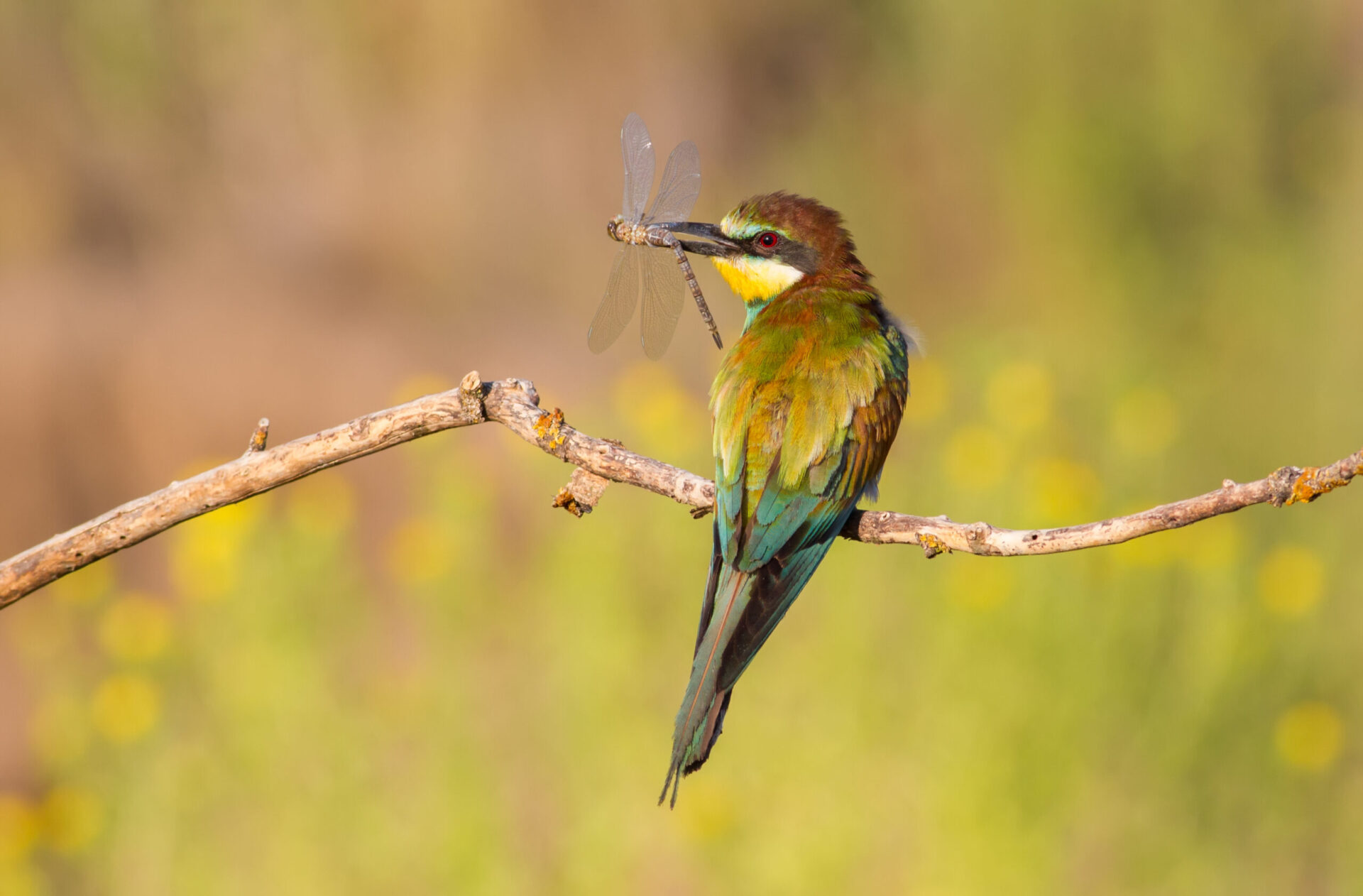
Monthly intention
They watched Him closely” (Lk 14:1)
Hearing Creation’s Cry
Hearing Creation’s Song
Ecological conversion story
Inspiring Saint
Laudato Si’ Circles
Season Of Creation 2022
If you prefer, you can download this resource in PDF format by clicking here.
Monthly intention
August 2022
Praising God for the gift of biodiversity and praying for its preservation
“Because of us, thousands of species will no longer give glory to God by their very existence, nor convey their message to us” (LS 33).
Prayer for extinct and endangered
Lord God, our Creator all life forms that exist on our sister Mother Earth come from Your hands. You created us in the diversity of genera and species, giving each of Your creatures a unique and singular mark. We praise You, O Father, with all Your creatures! We praise You, our Lord, for biodiversity!
We contemplate Your action that transforms and recreates everything, in the diversity of species that throughout natural history have been appearing or being naturally extinct, as a natural result of evolution. Each species contributes, in its own way to offer humanity, free of charge, the ecosystemic services that beautify, dignify and fill human life with colors and meaning.
However, today we see the threat to the diversity of life in our common home, and that human action throughout history has drastically accelerated the rate of extinction of species, in creasing up to 1,000 times the natural rates.
Inspired by Pope Francis, we want to reaffirm:
“We have no right to do so” (LS 33). We want to turn the cry of the earth and the cry of the poor into our cry. Teach us, Lord, to care for creation! Inspire us to commit ourselves and engage in concrete actions to protect and conserve every species on our planet. Through Christ, Your Son and our brother. Amen.
By Friar Wellington Buarque, OFM, Laudato Si’ Animator. Pernambuco, Brazil.
Go to top
They watched Him closely” (Lk 14:1)
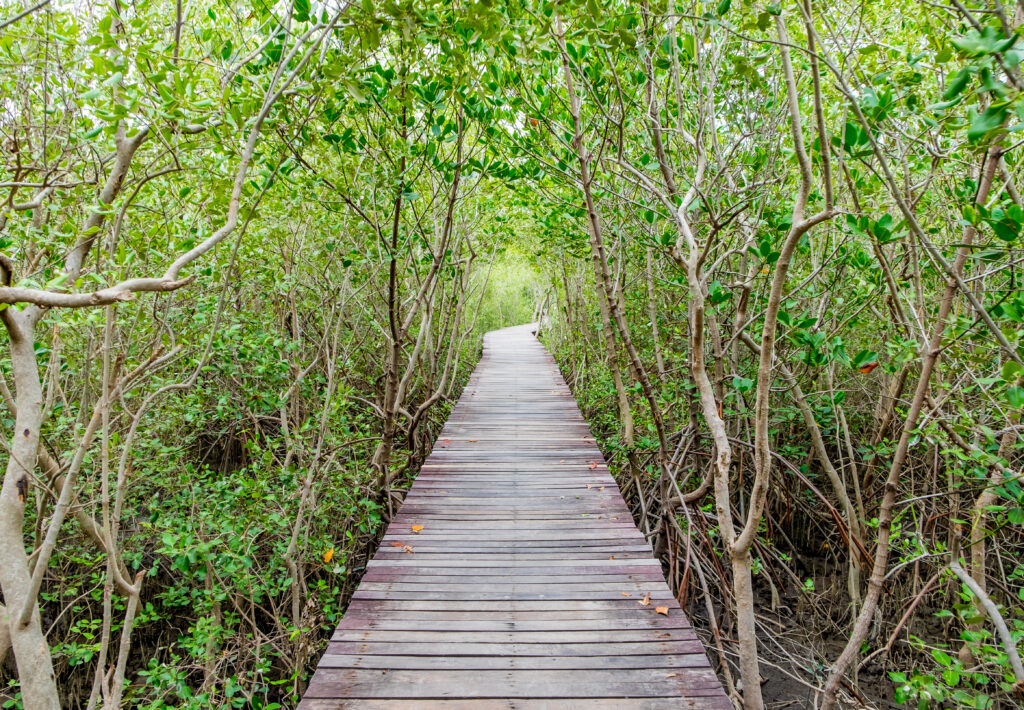
Wood boardwalk between Mangrove forest.
Fr. Makagutu OFMCap
Just as the Pharisees watched Jesus closely to see what He did on the Sabbath day, the next generation has intently put their eyes on us to see if we really care about the loss of biodiversity leading to the extinction of species which scientists report to be at its peak in this century and how we are responding to the dangers of this loss. Are we consciously keeping the ecosystem under constant observation so as to curb biodiversity loss?

Fr. Makagutu OFMCap
The first goal of the recently concluded Fourth Open-Ended Working Group on post-2020 Global Biodiversity Framework meeting in Nairobi aims at protecting biodiversity at all levels and preventing extinctions. However, the delegates in this meeting were still divided on if by 2050 we should target halting the extinction of species completely or just reducing biodiversity loss by half.
In Laudato Si’, Pope Francis reminds us of the grave effects of human-driven harm to biodiversity: “Because of us, thousands of species will no longer give glory to God by their very existence, nor convey their message to us” (LS 33). This leads us to our second reflection question: In what way are you responsible for the biodiversity loss?
The gospel reading talks of how we regard the poor in society by failing to invite them to functions because they have nothing to offer in return (Lk 14:12). This can be compared to how we treat biodiversity, which is “considered at most a deposit of economic resources available for exploitation, with no serious thought for the real value of things, their significance for persons and cultures, or the concerns and needs of the poor” (LS 190). The poor, the Indigenous communities and the vulnerable bear the greatest brunt of the loss of biodiversity.
For a while now, the work of bringing Laudato Si’ to life has met hurdles in Africa and many parts of the word mostly due to a lack of knowledge about this papal document. The cry of nature has at last reached the ears of the Catholic Bishops in Eastern Africa. The Association of Members of Episcopal Conferences in Eastern Africa (AMECEA), during its 20th plenary between 11th and 17th of July 2022, has chosen Laudato Si’ as the theme of this meeting aiming to lead humanity toward the care for creation.
To care for creation requires one to be a humble steward, a virtue that the Gospel text refers to when it speaks about how we ought to choose our places of seating when invited for functions. Many in the universe have forgotten that the commandment towards stewardship was meant for humanity to be humble and faithful caretakers of God’s creation, and have instead felt entitled to plunder nature, leading to the loss of biodiversity. May we always remember the words of Greta Thunberg during the U.N. Climate Action Summit in New York City, “my message is that we’ll be watching you.”
Watch this reflection in video here:
Go to top
Hearing Creation’s Cry
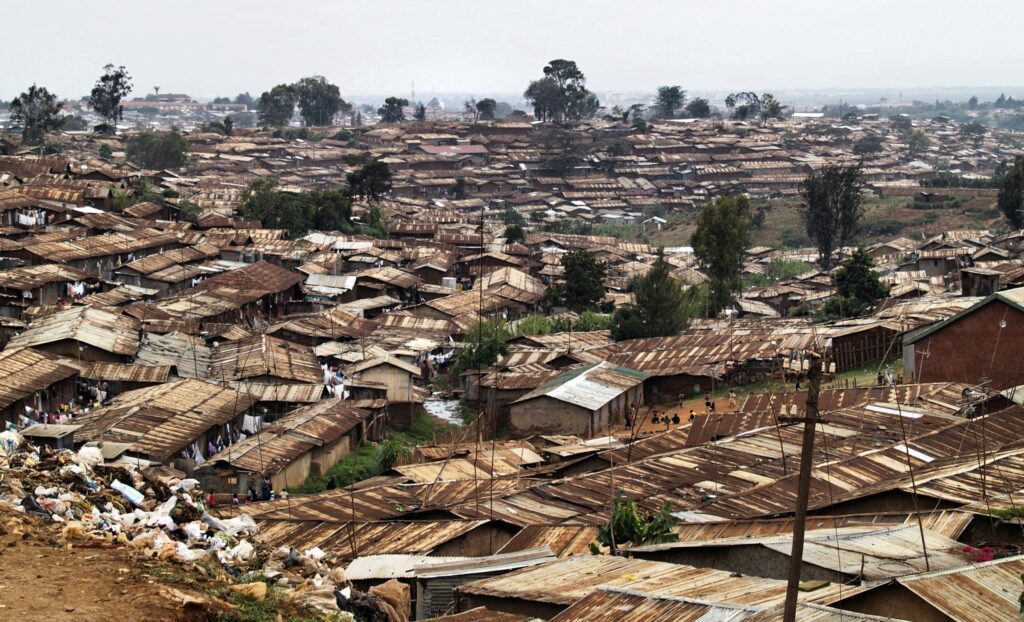
Kibera Slum, Kenya (photo: Christine Olson)
Kibera is Africa’s largest slum, the second largest slum in the world, and is located in Nairobi, Kenya. Living conditions are squalor, joblessness is at its highest, crime is rampant, and poverty is the song that you hear and see in every person you encounter.
The slum features an open sewerage system, poor or inexistent public amenities, a gullible youthful population susceptible to manipulation by politicians, and an overall neglect of the environment– land, water, and air.
Kibera is a true cry of both the poor and the earth. It’s a place that is calling
on all people to open their eyes and take action in reducing the suffering of
our mother earth and her people.
During this year’s Season of Creation celebrations, Laudato Si’ Movement- Africa will stand with the people of Kibera by organizing a prayer service on location to highlight the plight of God’s creation there. The prayer service will also mark the launch of the over 200Km pilgrimage from Kibera to the Top of Kilimanjaro, to bring to the attention of the COP27 in Egypt, Cairo, the suffering of God’s most vulnerable.
Go to top
Hearing Creation’s Song
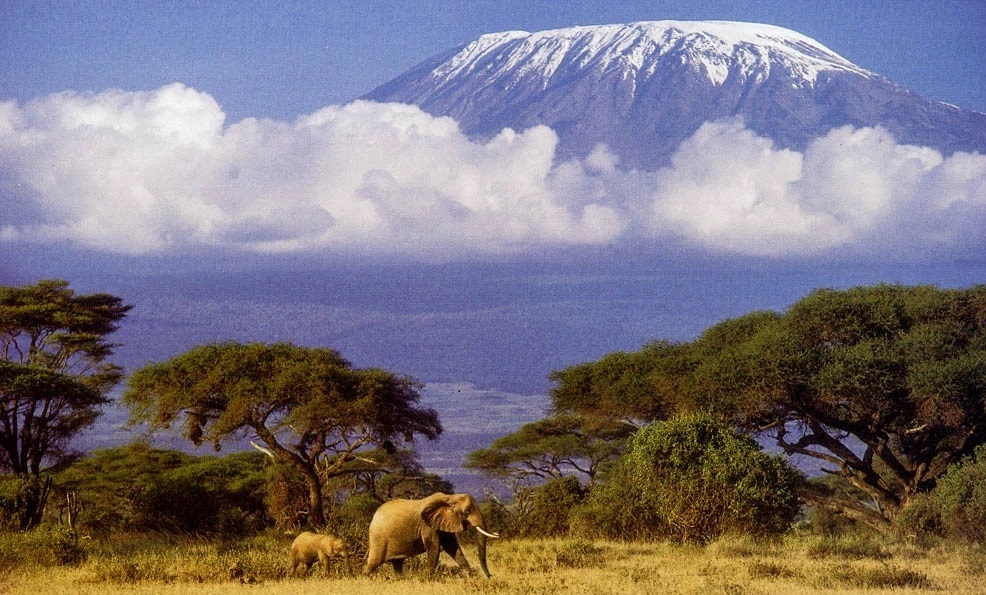
Mt. Kilimanjaro (photo: Steve Turner)
By Br. Benedict Ayodi, OFMCap
Located in Tanzania, Mount Kilimanjaro is Africa’s tallest mountain at about 5,895 meters (19,340 feet). It is the largest free-standing mountain rise in the world, meaning it is not part of a mountain range.
Also called a stratovolcano (a term for a very large volcano made of ash, lava, and rock), Kilimanjaro is made up of three cones: Kibo, Mawenzi, and Shira. Kibo is the summit of the mountain and the tallest of the three volcanic formations.
While Mawenzi and Shira are extinct, Kibo is dormant and could possibly erupt again. Scientists estimate that the last time it erupted was 360,000 years ago. The highest point on Kibo’s crater rim is called Uhuru, the Swahili word for “freedom.” The mountain is also known for its snow-capped peak; however, scientists warn that the snow might disappear within the next 20 years or so.
Mount Kilimanjaro has been formed by volcanic eruptions over the past three millions years, giving rise to the Shira, Mawenzi and the highest peak, Kibo. Like other tropical mountains, Mount Kilimanjaro hosts a spectacular sequence of natural ecosystems – from the hot savannah in the lowlands over a belt of dense submontane and cloud forests to the afroalpine shrub vegetation with fairytale-looking plants.
Due to the strong climate gradient found on tropical mountains, there is a very high turnover of species, making them the centers of biodiversity on the planet. In fact, there is no place in the world where you find a higher density of species than in tropical mountain regions. The plants, animals and microbes of tropical mountain regions maintain a large variety of ecosystem functions like water retention, nutrient cycling, carbon storage and pollination from which also human societies – near and far – strongly profit.
Go to top
Ecological conversion story
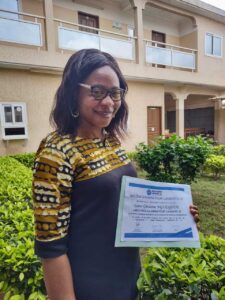 By Jeanne Ghislaine Nguegoue, Laudato Si’ Animator, Togo
By Jeanne Ghislaine Nguegoue, Laudato Si’ Animator, Togo
The Togolese Republic is a West African country with an incredible environmental diversity: fishing resources with the only deep-water port in the sub-region, important biodiversity (fauna and flora), natural reserves, varied ecosystems, and more. However, there are dangers to these natural resources. Vegetation fires remain an important ecological factor for the sustainable management of ecosystems.
However, the failure to manage it efficiently remains a major constraint for the conservation of biodiversity and the ecological balance of tropical ecosystems. If we remain passive spectators to these phenomena, instead of serving us, they will serve against us and even enslaving us.
Given the demonstrated irresponsible human behavior that has led to soil, air and water pollution and consequential health damage, it is important that Togolese youth undergo an ecological conversion and engage in actions that protect future generations.
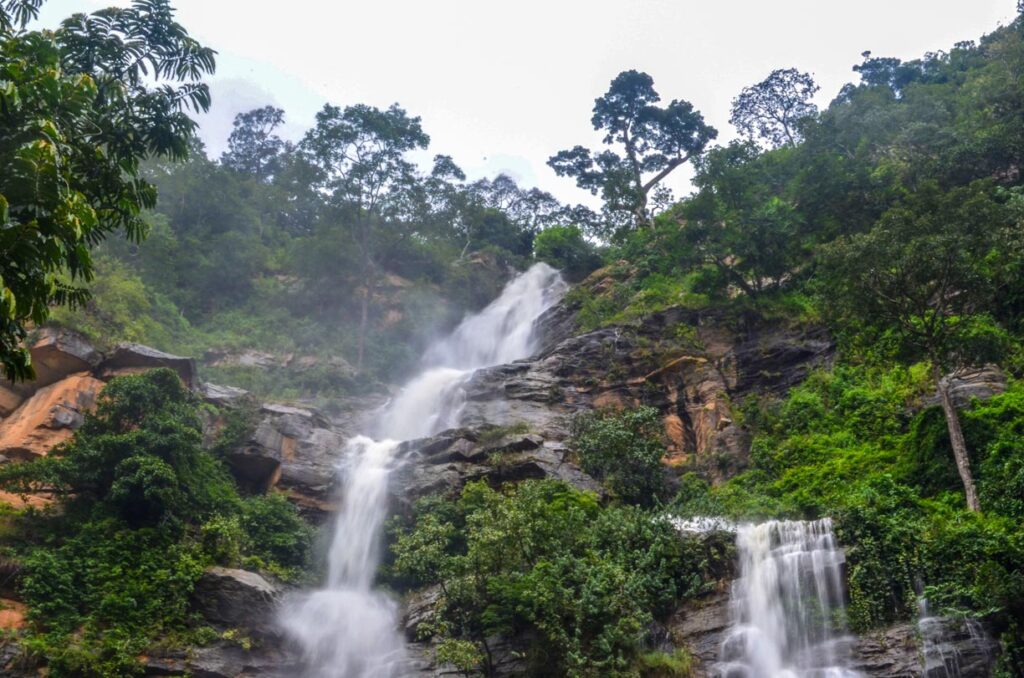
Cascade de Kpimé – Kpime waterfall near Kpalimé, in the Plateaux Region in southwest Togo. (Photo: jbdodane)
As a Laudato Si’ Animator, my personal conversion leads me to always meditate on my charisma and the message from Laudato Si’ and continually find ways to integrate creation in my spirituality. For example, I have decided to never step in a landscaped garden because I am aware that there are many “invisible” insects and invertebrates that are always stepped-on and killed.
I often visit nature to admire and be nourished by God’s creation, and have developed a great love for flowers. This gives me peace and joy to live, and I can see the hand of God in every creature and all of creation.
Go to top
Saint Augustine
Inspiring saint
Feast Day: August 28
By Christina Bagaglio Slentz
Eco-Conversion and St. Augustine: Believe what you see; become what you believe
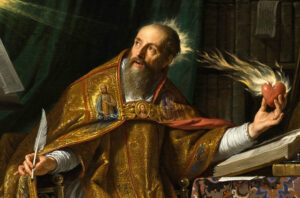 The restless life journey of Saint Augustine is a story of “fits and starts,” moving ever closer to God and reflecting the Augustinian values of unity, truth and charitable love. Augustine’s path to conversion, however, is by no means “pretty” and should give us all hope that we, too—in spite of all our imperfections—might someday attain to greatness if we only dare to trust in our God- graced capacity to become what we are not yet.
The restless life journey of Saint Augustine is a story of “fits and starts,” moving ever closer to God and reflecting the Augustinian values of unity, truth and charitable love. Augustine’s path to conversion, however, is by no means “pretty” and should give us all hope that we, too—in spite of all our imperfections—might someday attain to greatness if we only dare to trust in our God- graced capacity to become what we are not yet.
While many are familiar with Augustine’s notorious pre-conversion life of wine, women and a song of irresistible temptation, as well as his (truly) saintly mother’s best efforts to pray him into salvation, the influential role of creation in his faith formation is lessor known but arguably positions Augustine as an excellent candidate for patron saint of climate-deniers-turned-eco-spiritualists.
You see, as a brilliant academic, Augustine was inherently skeptical, which is not necessarily a bad thing. Rather, his desperate search for truth and propensity for critical questioning doggedly propelled him forward, fueled by blessedly high expectations and an insatiable demand for well-reasoned explanation. Like many skeptics, Augustine’s dissatisfaction with the en vogue belief systems of the day was born of his innermost desire to believe; he profoundly yearned for satisfactory answers that would bring him peace.
The only thing holding him back was Augustine, himself.
In spite of his growing awareness of the truth of Christianity, Augustine quite openly admitted his unwillingness to concede to a key tenet of faith, praying to the Lord: “Give me chastity and continence, but not yet!”. Addicted to the consumption of pleasure, Augustine was blinded from seeing the joy of becoming an adherent to what he increasingly suspected to be the truth he sought.
Buoyed by the fellowship of companion converts — aren’t we all?— Augustine “got by with a little help from his friends” and a mysterious childlike voice, which he heard at a moment of profound crisis, drawing him to a line of Scripture from St. Paul that admonished precisely the waywardness to which Augustine had clung and encouraged, rather, a life in Jesus Christ. Augustine surrendered.
After his conversion and ordination, Augustine delved deeply into the study of creation, taking both literal as well as allegorical approaches to his interpretation of the book of Genesis. Through his scriptural analysis and observations of the world, Augustine expanded his understanding of God, the Trinity, time, the relationship between heaven and earth, and God’s intention for humanity.
Having recognized God as existing outside of time and therefore unchanging, Augustine concluded time is born of earthly change, which unfolds as a result of seminal seeds planted in our world at the beginning of creation, subsequently yielding opportunity for our growth, development and transformation. In this gift of time, we are invited to see, believe, and become more like God.
As Augustine attributes creation to the will of God —a chosen act and out of goodness— this gift and invitation reflect God’s love for us and desire for us to respond with love in return. This eco-spiritual positioning of creation at center in the dynamics of a loving relationship with God suggests once Augustine abandoned his self-centered view of a “good life”, he was free to see true goodness in all that surrounded him, materially and spiritually, and to respond to God’s loving call for relationship and communion.
Similarly, when we liberate ourselves from consumptive pleasures that obscure our full view of the Risen Christ in everything around us, we find unending peace in our spiritual interconnectedness with all of creation and escape the restless, endless pursuit of short- lived earthly reward. Therefore, those struggling with skepticism of human-caused environmental devastation, blocked from seeing the truth for the sake of their own addiction to consumption and material comfort might find in Augustine a role model for the promise of eco- conversion and transformation.
For the times we choose not to see our Risen Lord in all of creation and fail to live in unity with our brothers and sisters of our common home, Saint Augustine, pray for us!
Go to top
The first circle of the Malawi Chapter
Laudato Si’ Circles
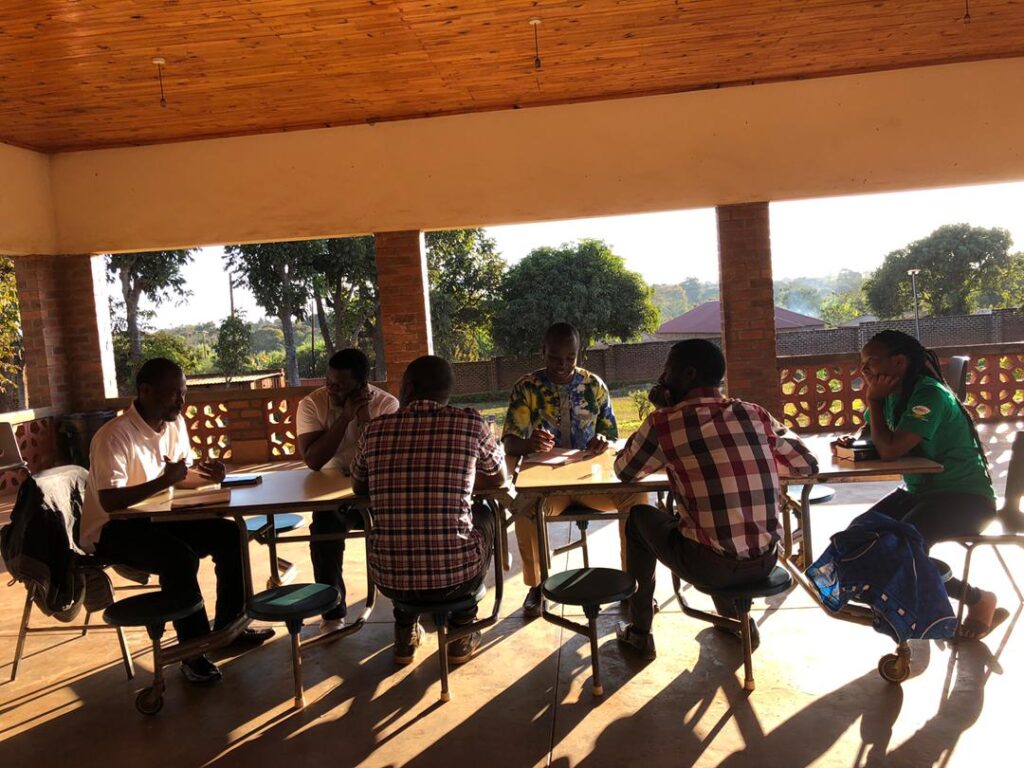
Malawi’s new circle
By. Sr. Immaculate Tusingwire MMS, Laudato Si’ Circle, Malawi Chapter
Being a new Chapter with Animators scattered across the country and growing membership to more than 50, the Malawi chapter started a conversation regarding whether it should start new Circles. The geographic area with the biggest number of Animators was identified, and the Animators got very excited at the thought of coming together.
On the day that had been decided upon, seven Certified Laudato Si’ Animators came together and started the first Circle of the Chapter, which was named the St. Francis circle. The members were very happy and excited to finally meet each other in-person at the joyful encounter! After prayer and introductions, the Laudato Si’ movement guidelines and core values were reviewed.
The group then went into a reflection, discernment and discussion about the Circle’s logistics. It was agreed that the Circle would cover the geographical area of Lilongwe Diocese, hold monthly meetings, have an ecological exam at each meeting and discuss action engagement.
Since the Circle is at its initial stage, its members will continue reading and sharing the Laudato Si’ encyclical and the monthly Laudato Si’ Encounter among themselves. The group has also elected a coordinator and will be looking into other leadership roles as needed.
As the pioneering Circle, the members have made a commitment to grow and start other Circles in different parishes of the Diocese. Inspired by this pioneering Circle, a process has started in two more Dioceses to start Circles there.
Belonging to a Circle is really exciting and energizing, strengthening us on our synodal journey as we accompany each other on the path of ecological conversion. It brings new hope, new enthusiasm and a new fire for action!
Go to top
Preparing ourselves for the Season of Creation
For the first time, Pope Francis has published in advance his message for the World Day of Prayer for the Care of Creation, which is celebrated every September 1. It marks the beginning of the Season of Creation, an ecumenical period that unites Christians to pray and take action for our common home.
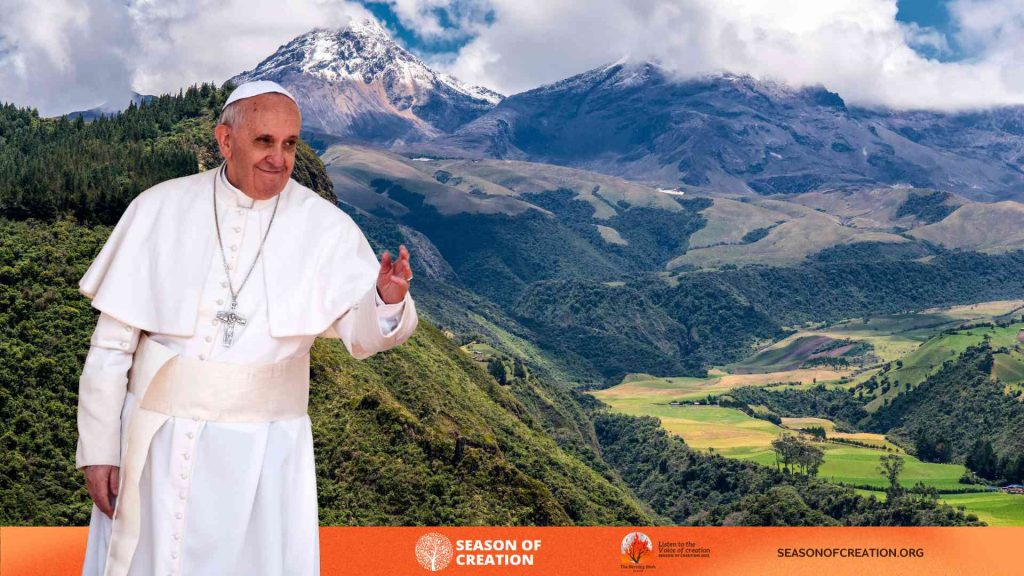
What does the message say? We summarize it in four key points:
- A time to cultivate our ecological conversion
The Pope defines the Season of Creation as “an opportunity to cultivate our ‘ecological conversion’”, recalling this concept encouraged by St. John Paul II as a response to the ‘ecological catastrophe’ announced by St. Paul VI as early as 1970.
In this way, he invites all Christians during this time to “pray once more in the great cathedral of creation, and revel in the “grandiose cosmic choir” made up of countless creatures, all singing the praises of God”.
People of faith, says the Pope, feel “even more responsible for acting each day in accordance with the summons to conversion. Nor is that summons simply individual: “the ecological conversion needed to bring about lasting change is also a community conversion”.
- Sweet song and bitter cry
Listening to creation, Francis mentions that there is a “kind of dissonance”: “On the one hand, we can hear a sweet song in praise of our beloved Creator; on the other, an anguished plea, lamenting our mistreatment of this our common home”.
In this regard, the Executive Director of Laudato Si’ Movement, Tomás Insua, mentioned: “The sweet song of creation is mixed with its bitter cry, as evidenced by the intense heat wave that is experienced in much of the northern hemisphere and that has already killed, only in Spain and Portugal, more than 1000 people or has left 5 million people without water in Monterrey, Mexico”.
Francis encourages people to stop consumerism, change lifestyles and harmful systems. All scientific reports prove it and the Pope reaffirms it: “We are reaching ‘a breaking point’” and we must act now. “The crisis is no longer a hypothesis of a distant future but a tangible reality that is costing human lives,” added Tomás.
- A warning message ahead the COPs
Ahead COP 27 on climate (Egypt, November 2022) and COP 15 on biodiversity (Canada, December 2022) Francis recalls in his message the importance of “promoting the effective implementation of the Paris Agreement”, as recently ratified by the Holy See.
“Each passing moment is an opportunity for everyone, especially world leaders, to reverse the biodiversity and climate crises. Let COP 27 bring forth ambitious commitments to prevent carbon emissions from fossil fuels and support for clean energy transition as well as efficient relief for our brothers and sisters already within the climate crisis. Let COP 15 bring forth a firm commitment to end any more biodiversity collapse”, said Lindlyn Moma, Advocacy Director of the Laudato Si’ Movement.
And to the community of Catholics, the Pope calls them to prayer: “In this Season of Creation, let us pray that COP27 and COP15 may unite the human family to decisively address the double crisis of climate and biodiversity reduction”.
- Four key principles for biodiversity
Francis also uses his message to call on nations to halt the further collapse of the “web of life” – biodiversity – pointing to four principles:
- Building a clear ethical basis for the transformation we need in order to save biodiversity;
- Fight biodiversity loss, support its conservation and recovery, and meet people’s needs in a sustainable way;
- Promote global solidarity, taking into account that biodiversity is a global common good that requires a shared commitment;
- Put people in vulnerable situations at the center, including those most affected by biodiversity loss, such as indigenous peoples, older people and youth.
Join us in the Season of Creation 2022, visit our website and consider organizing an event with your community. Consult the Celebration Guide.
Go to top






Thank you for this beautiful Newsletter. It brings to me the richness of our beautiful planet and with it, the hope that we will work together, wherever we are, to honour and preserve it.
Mary O’Farrell ibvm